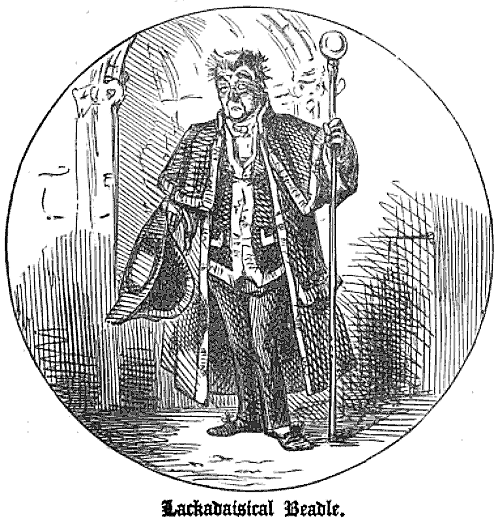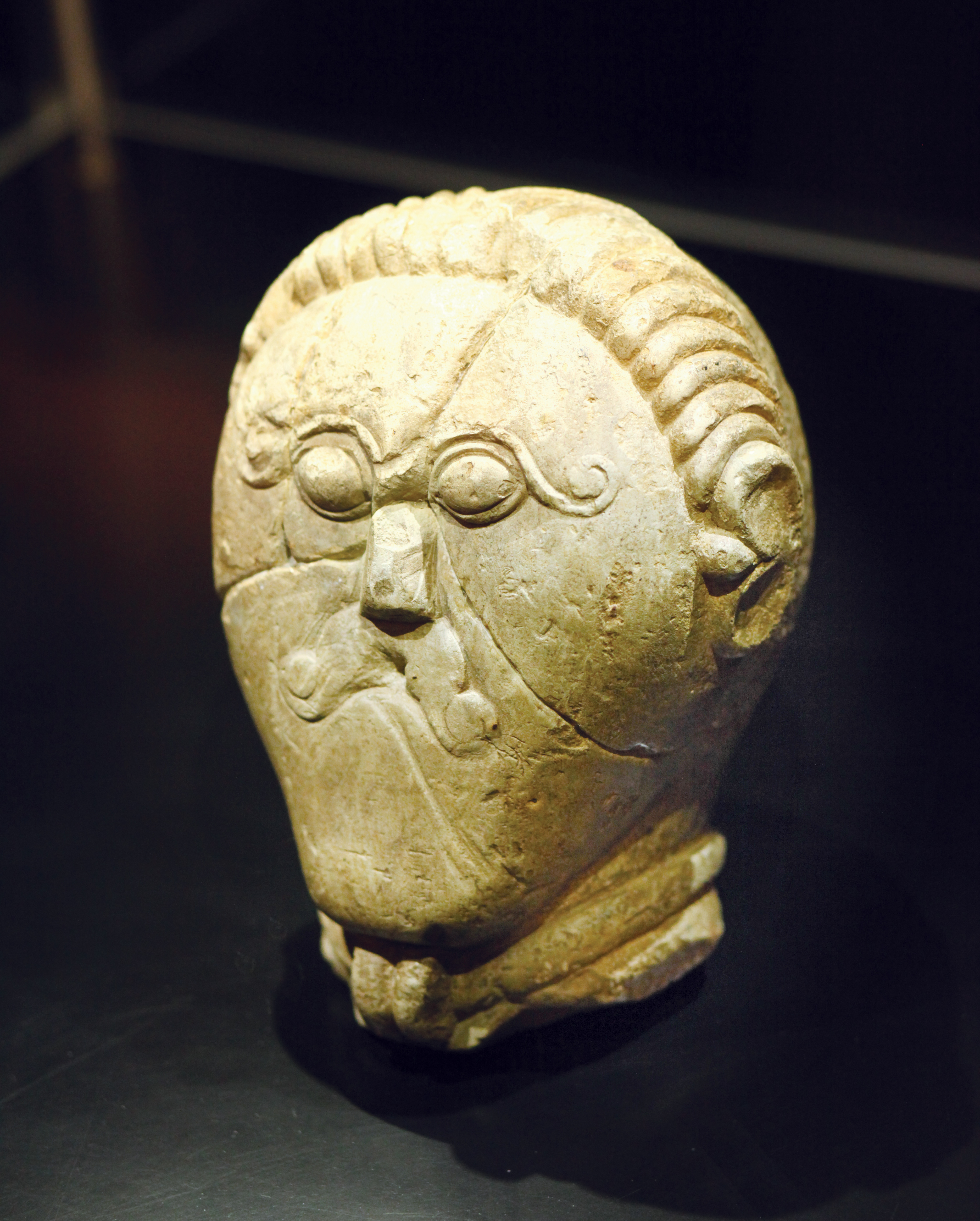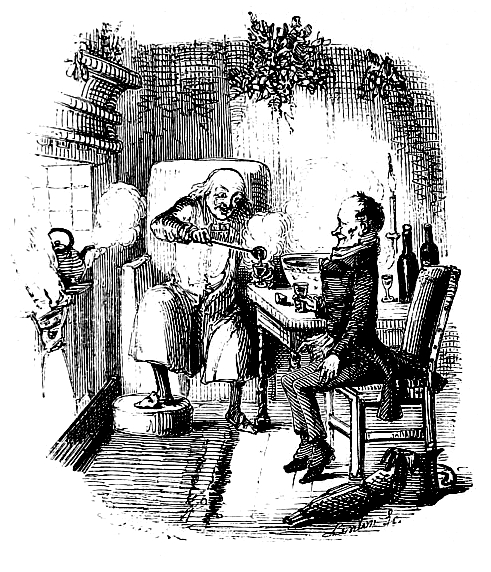|
Blackadder's Christmas Carol
''Blackadder's Christmas Carol'', a one-off episode of ''Blackadder'', is a parody of Charles Dickens' 1843 novella ''A Christmas Carol''. It is set between ''Blackadder the Third'' (1987) and ''Blackadder Goes Forth'' (1989), and is narrated by Hugh Laurie. Produced by the BBC, it was first broadcast on BBC1 on 23 December 1988. Plot Ebenezer Blackadder (Rowan Atkinson), the Victorian proprietor of a "moustache shop", is the nicest man in England. He is everything that Ebenezer Scrooge was by the end of the original story: generous and kind to everybody, and sensitive to the misery of others. As a result, people take advantage of his kindness – Mrs. Scratchit and an orphan take all his money, his god-daughter Millicent takes his presents and Christmas tree, and a beadle takes his food. All but Mr. Baldrick (Tony Robinson) view him as a victim. His business turns no profit, all his earnings go to charity and con artists, and despite his positive attitude, he lives a lonely, ... [...More Info...] [...Related Items...] OR: [Wikipedia] [Google] [Baidu] |
Period Piece
A historical drama (also period drama, costume drama, and period piece) is a work set in a past time period, usually used in the context of film and television. Historical drama includes historical fiction and romances, adventure films, and swashbucklers. A period piece may be set in a vague or general era such as the Middle Ages, or a specific period such as the Roaring Twenties, or the recent past. Scholarship Films set in historical times have always been some of the most popular works. D. W. Griffith's ''The Birth of a Nation'' and Buster Keaton's '' The General'' are examples of popular early American works set during the U.S. Civil War. In different eras different subgenres have risen to popularity, such as the westerns and sword and sandal films that dominated North American cinema in the 1950s. The ''costume drama'' is often separated as a genre of historical dramas. Early critics defined them as films focusing on romance and relationships in sumptuous surroundings, cont ... [...More Info...] [...Related Items...] OR: [Wikipedia] [Google] [Baidu] |
576i
576i is a standard-definition television, standard-definition digital video mode, originally used for digitizing analog television in most countries of the world where the utility frequency for electric power distribution is 50 Hz. Because of its close association with the legacy color encoding systems, it is often referred to as PAL, PAL/SECAM or SECAM when compared to its 60 Hz (typically, see PAL-M) NTSC-colour-encoded counterpart, 480i. The ''576'' identifies a vertical resolution of 576 lines, and the ''i'' identifies it as an Interlaced video, interlaced resolution. The field rate, which is 50 Hertz, Hz, is sometimes included when identifying the video mode, i.e. 576i50; another notation, endorsed by both the International Telecommunication Union in BT.601 and SMPTE in SMPTE 259M, includes the frame rate, as in 576i/25. Operation In analogue television, the full Raster scan, raster uses 625 lines, with 49 lines having no image content to allow time for cathode r ... [...More Info...] [...Related Items...] OR: [Wikipedia] [Google] [Baidu] |
Blackadder II
''Blackadder II'' is the second series of the BBC sitcom '' Blackadder'', written by Richard Curtis and Ben Elton, which aired from 9 January 1986 to 20 February 1986. The series is set in England during the reign of Queen Elizabeth I (1558–1603), and sees the principal character, Edmund, Lord Blackadder, as a Tudor courtier attempting to win the favour of the Queen while avoiding execution by decapitation, a fate that befell many of her suitors. The series differed markedly from ''The Black Adder'', notably with Ben Elton replacing Rowan Atkinson as the second writer, filming in studio sets, rather than on location, the introduction of a Machiavellian ''"Blackadder"'' character and a less intelligent Baldrick.Lewisohn, Mark''Blackadder II''at the former BBC Guide to Comedy. Retrieved 17 March 2007 Plot The series is set during the Elizabethan era (1558–1603). The principal character, Edmund, Lord Blackadder ( Rowan Atkinson), is the great-grandson of the original Bla ... [...More Info...] [...Related Items...] OR: [Wikipedia] [Google] [Baidu] |
Baldrick
Baldrick is the name of several fictional characters featured in the long-running BBC historic comedy television series '' Blackadder''. Each one serves as Edmund Blackadder's servant and sidekick and acts as a foil to the lead character. Each series of ''Blackadder'' is set in a different period in British history, and each Baldrick character (as with the character of Edmund) is a descendant of the Baldrick from the preceding series. Just as Blackadder exists in many incarnations throughout the ages, so does Baldrick; whenever there is a Blackadder there is a Baldrick serving him. They are all portrayed by Sir Tony Robinson (although in the unaired pilot episode he was played by Philip Fox). The relationship between Edmund and Baldrick evolves significantly; in the first series of the show, Baldrick is more intelligent than Blackadder, but this dynamic is reversed in subsequent series, with Baldrick's intelligence decreasing as the show continued. He is the only character o ... [...More Info...] [...Related Items...] OR: [Wikipedia] [Google] [Baidu] |
Beadle
A beadle, sometimes spelled bedel, is an official of a church or synagogue who may usher, keep order, make reports, and assist in religious functions; or a minor official who carries out various civil, educational, or ceremonial duties on the manor. The term has pre-Conquest origins in Old English, deriving from the Old English ''bydel'' ("herald, messenger from an authority, preacher"), itself deriving from ''beodan'' ("to proclaim", which has a modern descendant in the English verb ''bid''). In Old English it was a title given to an Anglo-Saxon officer who summoned householders to council. It is also known in Medieval Latin as ''bedellus''. The Domesday Book refers to Beadles as ''bedelli'' or undersheriffs of manors. In religion In England, the word came to refer to a parish constable of the Anglican Church, one often charged with duties of charity. A famous fictional constabulary beadle is Mr. Bumble from Charles Dickens's classic novel '' Oliver Twist'', who overs ... [...More Info...] [...Related Items...] OR: [Wikipedia] [Google] [Baidu] |
Ebenezer Scrooge
Ebenezer Scrooge () is the protagonist of Charles Dickens's 1843 novella ''A Christmas Carol''. At the beginning of the novella, Scrooge is a cold-hearted miser who despises Christmas. The tale of his redemption by three spirits (the Ghost of Christmas Past, the Ghost of Christmas Present, and the Ghost of Christmas Yet to Come) has become a defining tale of the Christmas holiday in the English-speaking world. Dickens describes Scrooge thus early in the story: "The cold within him froze his old features, nipped his pointed nose, shrivelled his cheek, stiffened his gait; made his eyes red, his thin lips blue; and spoke out shrewdly in his grating voice." Towards the end of the novella, the three spirits show Scrooge the errors of his ways, and he becomes a better, more generous man. Scrooge's last name has entered the English language as a byword for greed and misanthropy, while his catchphrase, " Bah! Humbug!" is often used to express disgust with many modern Christmas tradi ... [...More Info...] [...Related Items...] OR: [Wikipedia] [Google] [Baidu] |
Moustache
A moustache (; en-US, mustache, ) is a strip of facial hair grown above the upper lip. Moustaches have been worn in various styles throughout history. Etymology The word "moustache" is French, and is derived from the Italian ''mustaccio'' (14th century), dialectal ''mostaccio'' (16th century), from Medieval Latin ''mustacchium'' (eighth century), Medieval Greek μουστάκιον (''moustakion''), attested in the ninth century, which ultimately originates as a diminutive of Hellenistic Greek μύσταξ (''mustax'', ''mustak-''), meaning "upper lip" or "facial hair", probably derived from Hellenistic Greek μύλλον (''mullon''), "lip". An individual wearing a moustache is said to be "moustached" or "moustachioed" (the latter often referring to a particularly large or bushy moustache). History Research done on this subject has noticed that the prevalence of moustaches and facial hair in general rise and fall according to the saturation of the marriage market. Thus, ... [...More Info...] [...Related Items...] OR: [Wikipedia] [Google] [Baidu] |
Ebenezer Blackadder
Edmund Blackadder is the single name given to a collection of fictional characters who appear in the BBC mock-historical comedy series ''Blackadder'', each played by Rowan Atkinson. Although each series is set within a different period of British history, each character is part of the same familial dynasty and is usually called Edmund Blackadder. Each character also shares notable personality traits and characteristics throughout each incarnation. In a 2001 poll conducted by Channel 4, Edmund Blackadder was ranked third on their list of the 100 Greatest TV Characters. Common characteristics Each Blackadder is positioned in a different place in British society over each series, with the character mostly falling in social rank through history. He moves from a prince (''The Black Adder'') to a lord (''Blackadder II''), a knight/baronet ('' Blackadder: The Cavalier Years''), a royal attendant (''Blackadder the Third''), a shopkeeper (''Blackadder's Christmas Carol''), to an army c ... [...More Info...] [...Related Items...] OR: [Wikipedia] [Google] [Baidu] |
Blackadder The Third
''Blackadder the Third'' is the third series of the BBC sitcom ''Blackadder'', written by Richard Curtis and Ben Elton, which aired from 17 September to 22 October 1987. The series is set during the Georgian Era, and sees the principal character, Mr. E. Blackadder, serve as butler to the Prince Regent and have to contend with, or cash in on, the fads of the age embraced by his master. The third series reduced the number of principal characters again compared with the previous series, but instead included a number of significant cameo roles by well-known comic actors.Lewisohn, Mark''Blackadder the Third''at the former BBC Guide to Comedy. Retrieved 3 June 2007 The programme won a BAFTA award for Best Comedy Series in 1988 and received three further nominations.Awards at IMDb Retrieved 4 April 2008 Plot ''Bl ...[...More Info...] [...Related Items...] OR: [Wikipedia] [Google] [Baidu] |
A Christmas Carol
''A Christmas Carol. In Prose. Being a Ghost Story of Christmas'', commonly known as ''A Christmas Carol'', is a novella by Charles Dickens, first published in London by Chapman & Hall in 1843 and illustrated by John Leech. ''A Christmas Carol'' recounts the story of Ebenezer Scrooge, an elderly miser who is visited by the ghost of his former business partner Jacob Marley and the spirits of Christmas Past, Present and Yet to Come. After their visits, Scrooge is transformed into a kinder, gentler man. Dickens wrote ''A Christmas Carol'' during a period when the British were exploring and re-evaluating past Christmas traditions, including carols, and newer customs such as Christmas cards and Christmas trees. He was influenced by the experiences of his own youth and by the Christmas stories of other authors, including Washington Irving and Douglas Jerrold. Dickens had written three Christmas stories prior to the novella, and was inspired following a visit to the Field Lan ... [...More Info...] [...Related Items...] OR: [Wikipedia] [Google] [Baidu] |
Charles Dickens
Charles John Huffam Dickens (; 7 February 1812 – 9 June 1870) was an English writer and social critic. He created some of the world's best-known fictional characters and is regarded by many as the greatest novelist of the Victorian era.. His works enjoyed unprecedented popularity during his lifetime and, by the 20th century, critics and scholars had recognised him as a literary genius. His novels and short stories are widely read today. Born in Portsmouth, Dickens left school at the age of 12 to work in a boot-blacking factory when his father was incarcerated in a debtors' prison. After three years he returned to school, before he began his literary career as a journalist. Dickens edited a weekly journal for 20 years, wrote 15 novels, five novellas, hundreds of short stories and non-fiction articles, lectured and performed readings extensively, was an indefatigable letter writer, and campaigned vigorously for children's rights, for education, and for other social ... [...More Info...] [...Related Items...] OR: [Wikipedia] [Google] [Baidu] |
Blackadder
''Blackadder'' is a series of four period British sitcoms, plus several one-off instalments, which originally aired on BBC One from 1983 to 1989. All television episodes starred Rowan Atkinson as the antihero Edmund Blackadder and Tony Robinson as Blackadder's dogsbody, Baldrick. Each series was set in a different historical period, with the two protagonists accompanied by different characters, though several reappear in one series or another, e.g., Melchett (Stephen Fry) and Lord Flashheart (Rik Mayall). The first series, ''The Black Adder'', was written by Richard Curtis and Rowan Atkinson, while subsequent series were written by Curtis and Ben Elton. The shows were produced by John Lloyd. In 2000, the fourth series, ''Blackadder Goes Forth'', ranked at 16 in the 100 Greatest British Television Programmes, a list created by the British Film Institute. In a 2001 poll by Channel 4, Edmund Blackadder was ranked third on their list of the 100 Greatest TV Characters. In the ... [...More Info...] [...Related Items...] OR: [Wikipedia] [Google] [Baidu] |




